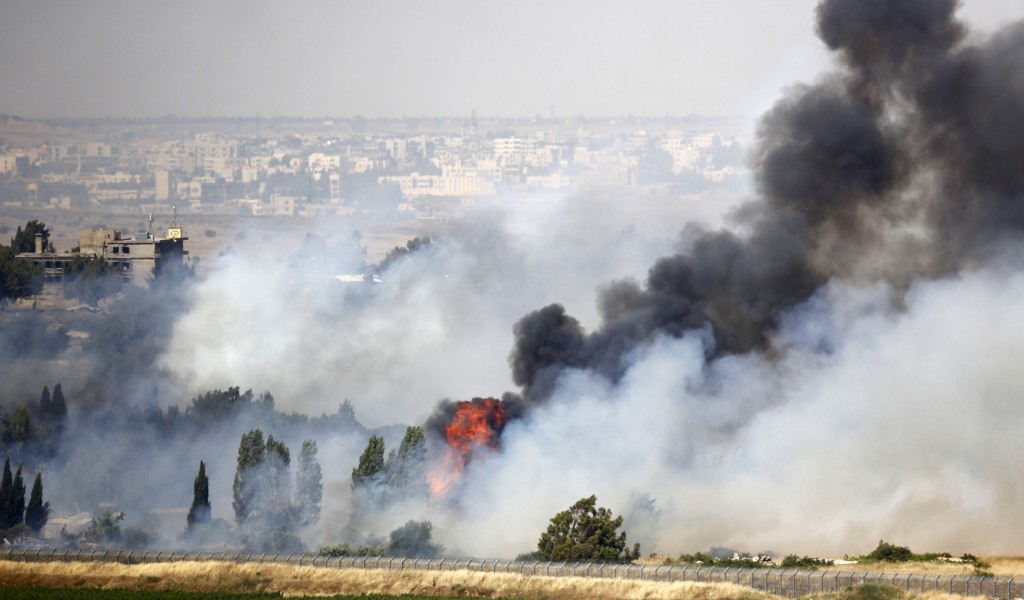Heavy Fighting on Israel-Syria Border

Tzefas Hospital emergency room evacuated when grenade found
The Syrian civil war raging across the border from Israel drew ominously closer on Thursday as government and rebel forces battled over control of the symbolically important Quneitra crossing.
Israel filed a complaint with the U.N. over the Syrian army’s incursion with tanks and artillery into the ceasefire area patrolled by the U.N., Israel Radio reported.
With fighting so close to the Golan Heights, where smoke from artillery fire could be seen across the landscape, which had been quiet for 40 years, the IDF took fresh precautions. Military authorities closed the road leading to Quneitra and warned civilians to avoid the border fence area. Kibbutz Ein Zivan, situated just hundreds of meters from the border fence, was declared off limits.
Earlier on Thursday, a mortar shell landed at a United Nations base in Quneitra, just a few hundred meters from the border fence separating Israel and Syria, according to media reports.
The U.N. peacekeeping operations chief confirmed the reports of fighting on the Syrian-Israeli border on Thursday.
Earlier, activists said rebels seized a U.N.-manned border crossing linking Israel and Syria. The crossing in a U.N.-patrolled demilitarized zone on the Golan Heights is the only passage between the two enemy countries, and its capture could heighten Israeli security concerns over Syria’s civil war, according to Reuters.
“Yes, there was shooting,” the U.N.’s Herve Ladsous told reporters during a visit to Paris.
Ladsous said the 1,000-strong United Nations Disengagement Observer Force (UNDOF) had taken measures to ensure the safety of its personnel but stressed that its involvement was not called into doubt by the incidents.
Nevertheless, Austria announced on Thursday its decision to withdraw its contingent from the area. (See separate article.)
Ladsous said the region had been “extremely confrontational” in the past year. “We are doing everything we can to reduce risks. We have closed posts that were too exposed, reinforced our equipment and vehicles, and our activities are more static,” he said.
Alex Kodish, the agricultural manager for Ein Zivan, was taking the latest developments in stride, moving his workers to the orchard farthest away from the border.
“We got away from the border fence so as not to put ourselves in danger, and besides that we’re business as usual,” he told Ynet, adding, “I heard explosions during the morning, and that is still going on. I also saw explosions on the [Syrian] side of the border.”
On the other hand, Ziv Medical Center in Tzefas was thrown into an uproar on Thursday when the emergency room and trauma unit had to be evacuated after a stun grenade was found in the pocket of one of two wounded Syrian nationals who were brought into the hospital earlier in the day, according to media reports.
Sappers called to the scene disposed of the grenade without further incident, after which patients were permitted to return.
The two Syrians had reportedly been wounded during the current fighting across the border, just a few miles from Tzefas.
“This is the first time such a thing has happened to me and, from what I recall, in the history of the hospital,” Dr. Oscar Ambon, Ziv director, told reporters.
Dozens of Syrians who arrived at the Quneitra crossing at about noon Thursday, seeking entry into Israel to escape the war, were turned back after the IDF determined that the danger in the area had passed.
This article appeared in print on page 6 of edition of Hamodia.
To Read The Full Story
Are you already a subscriber?
Click "Sign In" to log in!

Become a Web Subscriber
Click “Subscribe” below to begin the process of becoming a new subscriber.

Become a Print + Web Subscriber
Click “Subscribe” below to begin the process of becoming a new subscriber.

Renew Print + Web Subscription
Click “Renew Subscription” below to begin the process of renewing your subscription.












